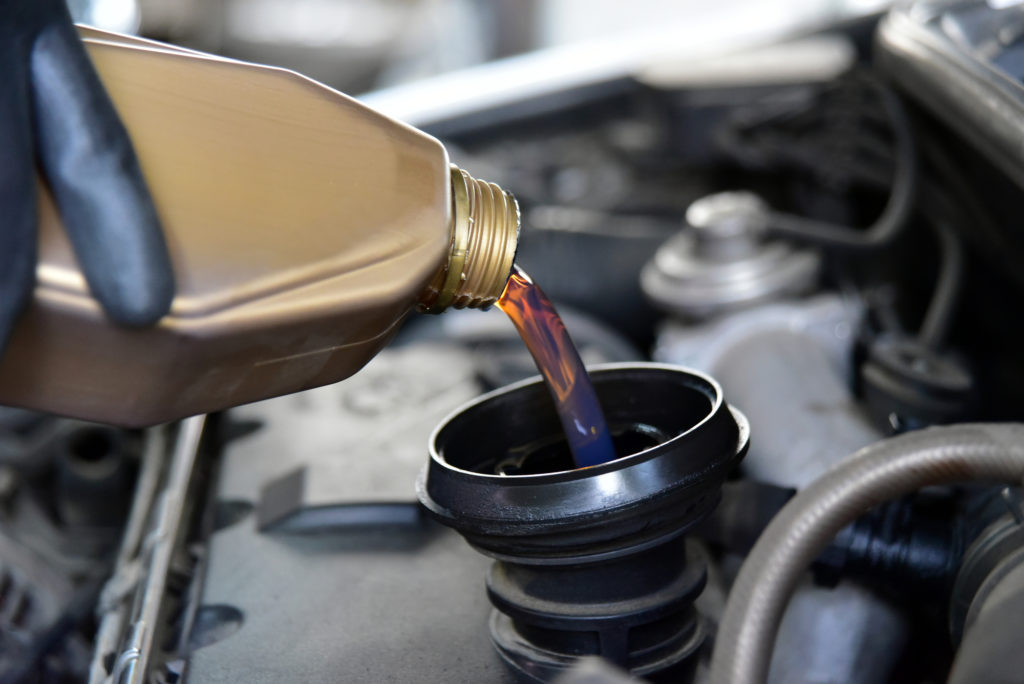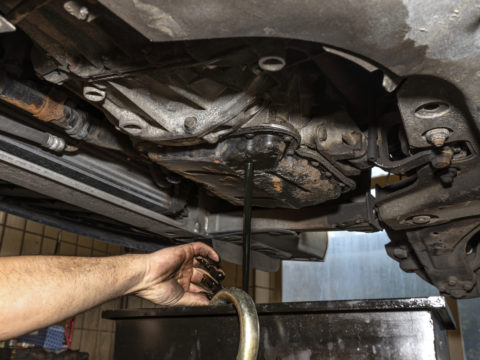Many people don’t know the differences between 75W-90 and 75W-140 oil. While it’s understandable for most car owners, it doesn’t mean that it is not a good idea to learn what these differences are. The more knowledge you have, the better you can tend to your vehicle.

Contents
What Is the Difference Between 75W-90 and 75W-140?
There is a lot of confusion around what these oils are and what they can do. Their names are not self-explanatory, but that does not mean that you cannot learn what they mean.
The two numbers in each name refer to the oil’s viscosity rating and the number of milliliters it takes to flow past an opening. You should note that they are both great options in different situations.
What Does 75W-90 Mean?
75W-90 means that this gear oil has a viscosity rating of 75. This rating lets car owners know how thick or thin the oil is. The second number indicates that it takes one second for 90 milliliters to flow past an opening.
What Does 75W-140 Mean?
Now that you know what the numbers in the first oil mean, you can probably guess what they mean for this lubricant. It has the same viscosity rating as it is listed at 75. However, it is a thinner oil because 140 milliliters can flow past an opening per second.
75W-90 and 75W-140 Gear Oil Differences Explored
To the layman, the statistics indicated by the name of each lubricant might not mean a lot. As a result, knowing what those numbers mean will not get you closer to figuring out which option is better for you. Fortunately, there are many differences for us to explore. Here you can learn about all the notable features of these two types of gear oils.
Notable 75W-90 Gear Oil Features
Let’s take a look at a few of the most prominent features of 75W-90 gear oil. Those features include:
- Overall performance
- Composition
- Oil pressure
- Viscosity
- Operating temperature
- Mileage
- Price per quart
Overall Performance
75W-90 gear oil is manufactured in a way that is deserving of praise. It can be effective in most cars, but where it excels is with load-bearing vehicles. Even under intense pressure, this gear oil holds up and ensures that you can complete your task.
Composition
If you want to know the exact composition of the mixture for this gear oil, you are out of luck. Unfortunately, most companies that produce gear oil do not reveal information about their additive packages.
That being said, most gear oil consists of base oil (whether it be mineral, semi, or fully synthetic) and a combination of additives.
Oil Pressure
Oil pressure is an important feature to consider when looking at gear oil. Its density at 15 degrees Celsius is 0.86 g/cm3. Additionally, the 90 in its name indicates that it flows 90 milliliters per second.
Viscosity
As we mentioned above, the density of any given oil is indicated by the first number in its name. In this case, the gear oil we are looking at has a viscosity rating of 75. At 100 degrees Celsius, this lubricant has a kinematic viscosity of 15.7. However, when the temperature gets to 40 degrees Celsius, the kinematic viscosity is increased to 115.
Operating Temperature
The enhanced thermal and oxidative stability of this oil allows it to work between temperatures of 149 and 177 degrees Celsius.
Mileage
When you use this gear oil, you should not notice any significant difference in your gas mileage. However, it should perform marginally better on the highway than on city roads.
Price Per Quart
The price of oil is constantly changing, and as a result, there is no one price that you can always rely on to purchase oil. Different suppliers will have different prices, so it is a good idea to shop around. That being said, you should be able to get a quart of this oil for a little under $25 at most stores.
Notable 75W-140 Gear Oil Features
Now that you know more about 75W-90, let’s take a look at the features of 75W-140 gear oil.
Overall Performance
You should not have any issues using this type of lubricant. It performs well in most conditions, and it works in most vehicles. As a result, if you are thinking of switching from old gear oil, 75W-140 is a good option for car owners.
Composition
We discussed this when talking about 75W-90 gear oil, but manufacturers do not typically make their additive packages public. As a result, it is impossible to know precisely what is in each type of gear oil other than base oil and a combination of additives.
Oil Pressure
This type of gear oil can operate under extreme pressure and typically works well for commercial use. Its density at 15 degrees Celsius is 0.89 g/cm3.
Viscosity
The viscosity rating of this gear oil is 75, as is indicated by the first number in its name. However, there are a few other key numbers to consider. Notably, at 100 degrees Celsius, the Kinematic Viscosity is 26.1. However, when the temperature gets down to 40 degrees Celsius, the kinematic viscosity is increased to 177.7.
Operating Temperature
75W-140 should function in most environments. As a result, it can operate in ambient temperatures ranging from -25 degrees Celsius to 30 degrees Celsius.
Mileage
When you use this oil in your vehicle, you should not notice any significant changes in gas mileage from what you were getting before.
Price Per Quart
The price of this type of oil is higher than the previous lubricant. One quart usually goes for around $65, although that number can change significantly depending on where you are purchasing it.

Pros and Cons of 75W-90 and 75W-140 Gear Oil
Here you can see all of the pros and cons of these two types of gear oil.
| Pros | Cons | |
| 75W-90 Gear Oil | This type of oil provides better fuel economy than other options.It performs better than other options when temperatures are low. | It is thicker in high temperatures, and as a result, it might struggle in higher temperatures compared to other options.You can expect this oil to lose its viscidity rapidly when you subject it to heavier loads. |
| 75W-140 Gear Oil | It is thinner at high temperatures, and as a result, it will perform better in hot climates.Optimal for wear protection and longevity. | The fuel economy is not as strong as other options.It does not perform well in low temperatures. |
You’ll notice that the 75W-90 oil does better at cooler temperatures, while 75W-140 does better at higher temperatures.
When to Use 75W-90 Oil
You can use this type of oil in most environments, although it does start to struggle at high ambient temperatures. As a result, it is better to use this type of oil if you live in a temperate climate. You can use it in Gearboxes that constrain API GL-5 performance.
When to Use 75W-140 Oil
This type of oil is fantastic in almost all situations. It performs well in conditions that have high resistance, and as a result, you can use it in both light and heavy-duty vehicles. It is a solid option for highway manufacturing, construction, and agriculture. However, you should note that this oil can start to struggle in low temperatures.
Which Is Better 75W-90 or 75W-140?
If you are trying to figure out which of these gear oils is better, you cannot look for a black and white answer. Both types of gear oil have their strengths and weaknesses. As a result, you need to consider what your current situation is. If you live in a cold area, you should consider using 75W-90, but if you live in a hot area, you should use 75W-140.
The other thing to consider is whether you are going to be performing heavy-duty tasks. If that is the case, you should lean towards using 75W-140.
Our Recommended 75W-90 or 75W-140 Gear Oil Brands
If you are looking to use 75W-90, these are some excellent gear oil brands:
- Valvoline
- Mobil
- Royal Purple
Conversely, if you are looking to purchase 75W-140 gear oil, you can check out these brands:
- Valvoline
- Lucas
- Royal Purple
FAQs
Here are some of the most frequently asked questions concerning these two types of gear oils.
Can you mix 75W-90 and 75W-140?
Sticking with the same gear oil will allow your vehicle to be more efficient. That being said, you should not run into any major problems if you accidentally mix the two oil types.
The likely result is that the two oils will combine in your vehicle. It means that it will combine to have about the same effect as using 75W-115 gear oil. This is the number directly in the middle.
You can run into problems if you mix oils with different viscosity ratings, but it should not be an issue since they have the same rating here.
Can I use 75W-140 instead of 75W-90?
Most people will not notice much difference when they switch between oil types. As a result, you can change from 75W-90 to 75W-140. That being said, you need to be conscious of the climate you live in.
Furthermore, switching to 75W-140 makes sense if you are going to be performing heavy-duty tasks.
Is 75W-90 gear oil synthetic?
Yes, this type of gear oil is synthetic. It is formulated from a synthetic base oil and a combination of additives. However, the manufacturers have not released the exact ingredients.
Is 75W-140 gear oil synthetic?
Yes, it is a thermally stable gear oil specifically engineered to exceed all performance requirements. Like 75W-90 gear oil, it uses synthetic base oil and a combination of additives.














